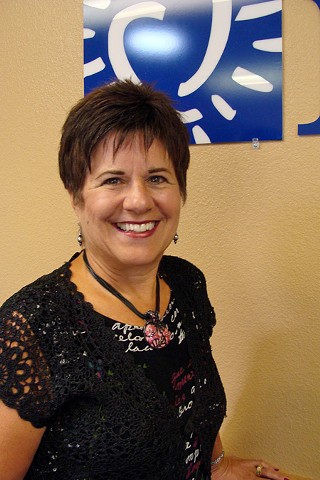It's been four months since Interfaith Community Services raised more than five tons of food through its major annual food drive, and now most of that food is gone. The food is used to supplement emergency food boxes given out at their office on Ina Road. According to Bonnie Kampa, ICS executive director, this is a record year for the number of people they've assisted. The organization recently received the 2010 Nonprofit of the Year Pinnacle Award from the Northern Pima County Chamber of Commerce. To help out, consider ICS's annual golf tournament in November, or organize a workplace food drive. For more info, go to icstucson.org.
How many years has the organization been around?
This year we celebrate our 25-year anniversary.
Where does your funding come from?
Our funding sources are varied and diverse and so, in fact, if you look at our (annual report) you will see that resources come from individual donors and faith communities, and corporate and fundraising events. We have government funds, and most of those go to support the emergency financial assistance programs, particularly state funds. City and county funds also go to support both our senior programs and emergency financial assistance.
The organization used to serve only the Northwest, and now you serve most of the greater Tucson area.
When we started it was as the Northwest Interfaith Center. The idea was to bring these faith communities together to focus on community needs right here in the Northwest area as it was growing. This was 25 years ago, and over the years I think because of gaps in services, if we had volunteers and resources we responded to the requests, particularly in the caregiving area. And so it made sense about five years ago to change our name. We looked at a map of our service area and the Northwest no longer represented who we were serving.
How many people do you think you serve each year?
Our numbers from last year, which are up from the previous year, showed that we served about 36,000 people. We know that number significantly increased this year, although we don't have an official number yet.
Do you think people understand how badly the economy is hurting people in our community?
On the front line here, the front desk, the calls are coming in every day. What we are seeing here are people who have never called before. The numbers have easily doubled over this past year and a half. We had our peak time, peak day Monday, Aug. 2. We had over 400 calls at the front desk by noontime. People asking for help with utilities, rent, little things, really searching for how they can get through a financial crisis. And at our food bank, we had almost 90 families in one day. So yes, the needs are great. We see that many are working families. They've been able to just hang on month after month, and then they finally get to a point where they are completely out of reserves. Jobs are also a problem. They just aren't able to find jobs. They are taking (less) pay, taking fewer hours.
A friend in nonprofit work said this economy has changed what everyone used to think was normal.
Now it' s a constant need, although we always see August and the holiday times are our two peak times. August because that' s when families are going back to school, and it takes all the discretionary income for clothes and supplies. They need a little help with food. Then the holiday time, because of all the demands, but this year we are seeing it steadily.
Why interfaith?
We realized we could sure do a lot more together than separately, because a lot of faith communities are looked to help both their own congregants and community members. We bring the resources together. Over the years, the beauty of that has been that our organization has been able to provide a real stability; we have the infrastructure and the organization to help volunteers. We have case workers who know the county system and resources. The volunteers who come in, many come in from the faith communities and they are able to automatically plug in. They also use us as a resource to help individuals in need and we are happy to do that. We're just able to do more together than any one of those congregations can do by themselves. We are nonsectarian, so the interfaith part really does represent a broad base of diverse groups of faith communities.





